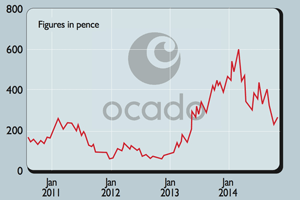Ocado’s surge shows what happens when a hated asset springs a surprise
Shares in online grocer Ocado – hated by investors – suddenly spiked. It shows what can happen when sentiment turns, and holds a lesson for the broader UK market.

Get the latest financial news, insights and expert analysis from our award-winning MoneyWeek team, to help you understand what really matters when it comes to your finances.
You are now subscribed
Your newsletter sign-up was successful
Want to add more newsletters?

Twice daily
MoneyWeek
Get the latest financial news, insights and expert analysis from our award-winning MoneyWeek team, to help you understand what really matters when it comes to your finances.

Four times a week
Look After My Bills
Sign up to our free money-saving newsletter, filled with the latest news and expert advice to help you find the best tips and deals for managing your bills. Start saving today!

Yesterday, investors got an object lesson in the dangers of short-selling.
Online grocery logistics specialist Ocado an oft-derided tech company secured a deal with mammoth US grocery chain Kroger.
The share price rose by more than 40% on the day. At one point, it had spiked by 80%.
MoneyWeek
Subscribe to MoneyWeek today and get your first six magazine issues absolutely FREE

Sign up to Money Morning
Don't miss the latest investment and personal finances news, market analysis, plus money-saving tips with our free twice-daily newsletter
Don't miss the latest investment and personal finances news, market analysis, plus money-saving tips with our free twice-daily newsletter
It just goes to show what can happen when a widely-hated asset starts to get some love.
The highly risky business of shorting stocks
My colleague Dominic Frisby wrote a good piece the other day about why investors should be grateful for short-sellers, investors who make money by betting on a share price falling, rather than rising.
Shorts get a lot of abuse; investors who are "long" a stock tend to hate having its prospects called into question. And often, if a company has become a short-selling target, it's because there are obvious reasons for concern.
The company's business model may be a faith-based, "jam-tomorrow" one; the accounts may be complex and hard to understand. In other words, there's often an element of "if you build it, they will come" (to quote that Field of Dreams film) to these sorts of companies.
No one likes to have their faith questioned. And that's what short-sellers do.
However, being short is risky. If you are long, you can only lose 100% of your stake. That's not nice, but you know the worst-case scenario. If you are short, then your losses are technically unlimited. A share price can just keep going up.
And worse still, the turnaround can happen fast. When that occurs, everyone races to close their short positions in a panic, and the price spikes. And it looks as though that's exactly what happened with Ocado yesterday.
The tech company, once best-known for driving bags of Waitrose shopping around the place, has been one of the most persistently shorted stocks around for years. It was set up in 2000 by a group of former Goldman Sachs bankers. It went public in 2010.
Back then, it was hard to see how it could expand, given its ties to Waitrose. And it also seemed hard to see why anyone would use it, given that other supermarkets had their own online delivery services. One analyst famously said, years ago now: "Ocado starts with an o', ends with an o' and is worth zero."
And yet it turns out that, occasionally, if you build it, they really do come. (It also helps that a backdrop of incredibly low interest rates has created a very forgiving environment against which to run "jam tomorrow" companies, of course.)
Ocado has gradually struck more and more deals over the years, and now this one with Kroger appears to be a game changer. It certainly proves that the concept is not fundamentally flawed, if nothing else.
This asset is hated too but not quite as much as it was a few months ago
Anyway, why are we talking about this today? I'm certainly not going to suggest you take a punt on Ocado, or short the stock either I have a poor record on tech stocks and I haven't been paying much attention to Ocado in recent years, so you'd have to do your own research on that front.
However, I do think that it's an interesting illustration of just how rapidly things can move when an asset that lots of people hate sees its fortunes change or starts to convince investors that they're wrong.
That seems relevant in the context of the broader British market. We've been pointing out for a while that the monthly fund manager surveys from Bank of America Merrill Lynch (BoAML) have been flagging up just how despised UK assets are. Fund managers have been more "underweight" (ie avoiding British assets), than at any point in the relatively long history of the survey, for a while now.
Yet with the rapid turnaround in the oil price (as my colleague Matthew Partridge pointed out to me the other day, less than a year ago, Brent was still foundering around the $45 a barrel mark), the FTSE 100 has had an injection of enthusiasm. It closed at a record high yesterday.
There is a sense that the Bank of England might not be keen to raise interest rates soon, and a slip in sterling has also helped. But what might also be behind the shift is the sense that the negativity on the UK might be overdone.
The latest BoAML survey showed that global fund managers are starting to warm to UK assets again. In the last couple of months, allocations have jumped rapidly. And yet, there's still a long way to go until Britain is back in the good books or even remotely popular. "The UK remains the consensus short amongst UK fund managers," as the survey puts it.
You don't have to be particularly keen on the UK to make the case for investing. Indeed, MoneyWeek regular Jonathan Compton wrote rather an unimpressed piece on the UK economy in the magazine just a few weeks ago. (If you're not already a subscriber, sign up here).
However, as Jonathan also pointed out the negativity is in the price. You don't need a hated asset to become loved to profit from buying it. You just need it to become a little less hated.
That may be what's happening now.
Get the latest financial news, insights and expert analysis from our award-winning MoneyWeek team, to help you understand what really matters when it comes to your finances.

-
 Should you buy an active ETF?
Should you buy an active ETF?ETFs are often mischaracterised as passive products, but they can be a convenient way to add active management to your portfolio
-
 Power up your pension before 5 April – easy ways to save before the tax year end
Power up your pension before 5 April – easy ways to save before the tax year endWith the end of the tax year looming, pension savers currently have a window to review and maximise what’s going into their retirement funds – we look at how
-
 As Ocado’s troubles mount, it’s time to sell
As Ocado’s troubles mount, it’s time to sellTips Online retailer Ocado has struggled to build value for shareholders, and still isn't turning a profit. If you hold Ocado shares, now might be a good time to sell, says Rupert Hargreaves.
-
 Ocado finally takes off
Ocado finally takes offFeatures Online grocer Ocado has been a “jam tomorrow” story for years. The jam now finally appears to have arrived. Alice Gråhns reports.
-
Ocado finally delivers a profit
News Online supermarket Ocado has finally delivered its first annual profit after 15 years.
-
 Shares in focus: Will Ocado ever make money?
Shares in focus: Will Ocado ever make money?Features Ocado's shares are pricey, but the online supermarket has promise. Should you buy in? Phil Oakley investigates.
-
 Ocado IPO: Don't touch it with a bargepole
Ocado IPO: Don't touch it with a bargepoleFeatures Ocado's flotation is like something out of the dotcom boom: an over-valued, loss making company in a desperate call for cash. But it's a great lesson in what to look out for in new issues, say Bengt Saelensminde.